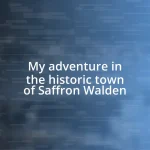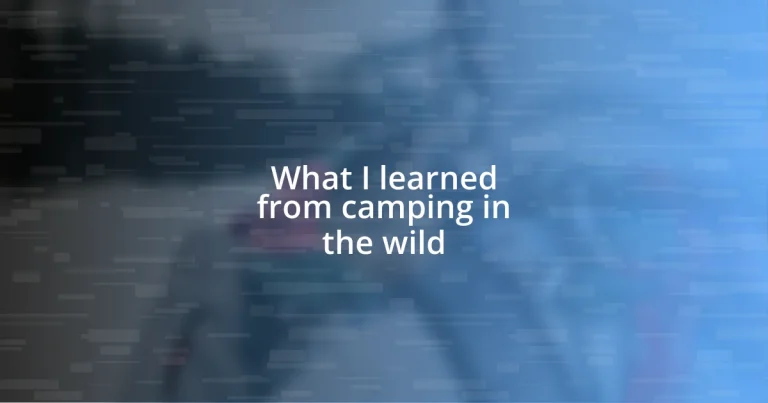Key takeaways:
- Meticulous preparation is essential for wild camping, including creating a detailed packing list and researching the camping area to understand potential hazards.
- Having essential gear, such as a reliable sleeping bag, cooking equipment, and a first-aid kit, significantly enhances the camping experience and ensures safety and comfort.
- Reflection during camping fosters a deeper connection with nature and self, allowing for moments of clarity and gratitude amidst the wilderness.
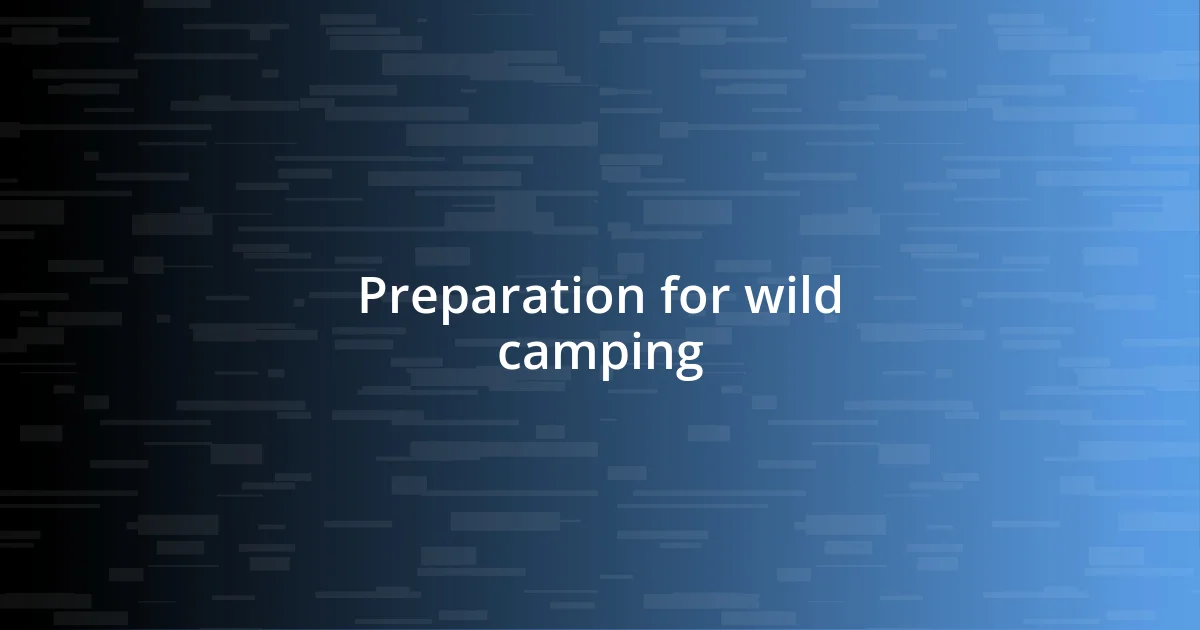
Preparation for wild camping
When preparing for wild camping, I always start with a packing list. It’s amazing how easily small items can be overlooked. I once forgot my cooking gear, which left me with only granola bars for a weekend. Believe me, after the first day, I was craving a hot meal. Have you ever been hungry in the wild? That experience taught me the importance of meticulously planning and double-checking supplies.
Next, I find that researching the camping area is crucial. Knowing what wildlife might be nearby can prevent some anxious moments. For example, the first time I camped in bear country, I spent hours making sure my food was stored properly. I can still recall the feeling of unease when I heard rustling outside my tent. Understanding the environment and potential hazards fosters a sense of security and confidence as you immerse yourself in nature.
Lastly, practicing setting up my tent at home has saved me from frustration on-site. Nothing is more stressful than trying to pitch a tent in the dark, especially when you’re already tired from the hike. I can still remember the first time I fumbled around in the middle of the night, feeling completely lost. So, my advice? Take time to practice in your backyard. That small investment pays off beautifully when you’re out in the wild and you can easily create a cozy patch of home under the stars.
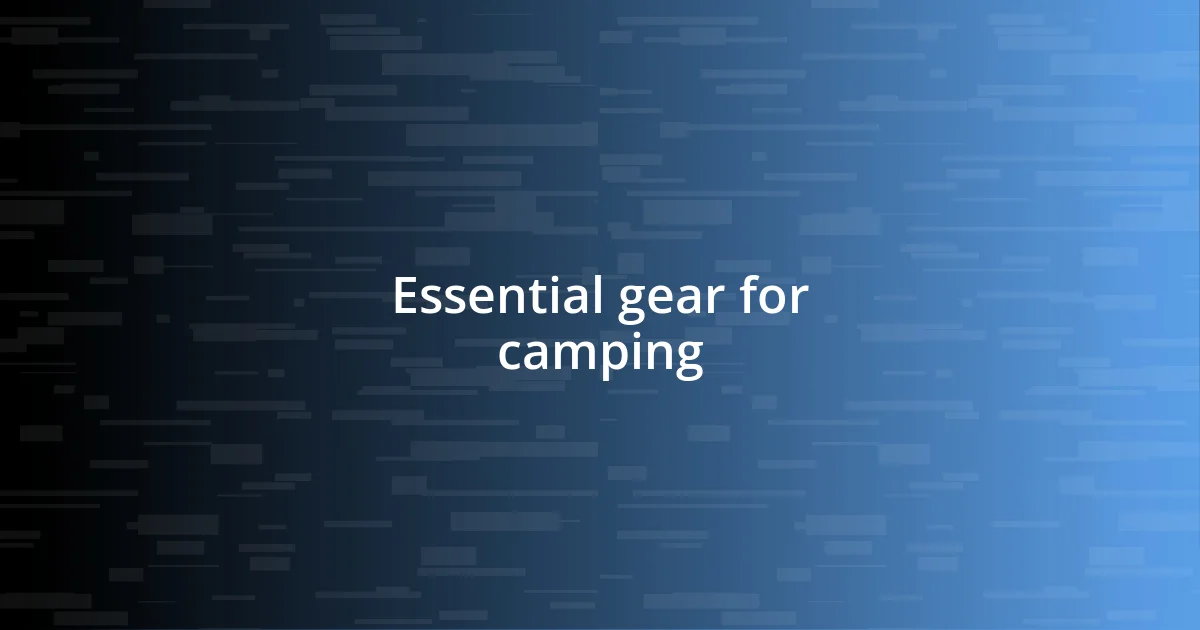
Essential gear for camping
When I think about essential camping gear, my mind always goes to the basics, like a reliable sleeping bag. I can’t stress enough how important a good night’s sleep is in the wild. I remember one trip where I skimped on my sleeping bag, and by dawn, I was shivering uncontrollably, wishing I had invested in something warmer. So, if you’re planning a camping journey, make sure your sleeping bag is appropriate for the weather!
Equally vital is the choice of cooking equipment. On one of my recent trips, I opted for a lightweight camping stove, which proved invaluable when I wanted to whip up a warm meal quickly instead of munching on cold snacks. The smell of fresh coffee brewing in the morning as I sat outside my tent was nothing short of heavenly. It reminded me that a hot meal can significantly elevate your camping experience, transforming a chilly morning into a comforting start.
When it comes to safety, I can’t forget about a good first-aid kit. During an unplanned hike, I stumbled and scraped my knee pretty badly. Thankfully, I had a well-stocked first-aid kit in my backpack. Applying the right ointment soothed the pain and made the rest of my trip much more enjoyable. Always packing smart gear not only prepares you for the wilderness but also adds a layer of peace of mind.
| Essential Gear | Importance/Experience |
|---|---|
| Sleeping Bag | Critical for comfort and warmth during the night. Invest wisely for a cozy experience. |
| Camping Stove | Turns cold snacks into warm meals that boost morale and enjoyment. |
| First-Aid Kit | Essential for treating injuries; peace of mind knowing you’re prepared for mishaps. |
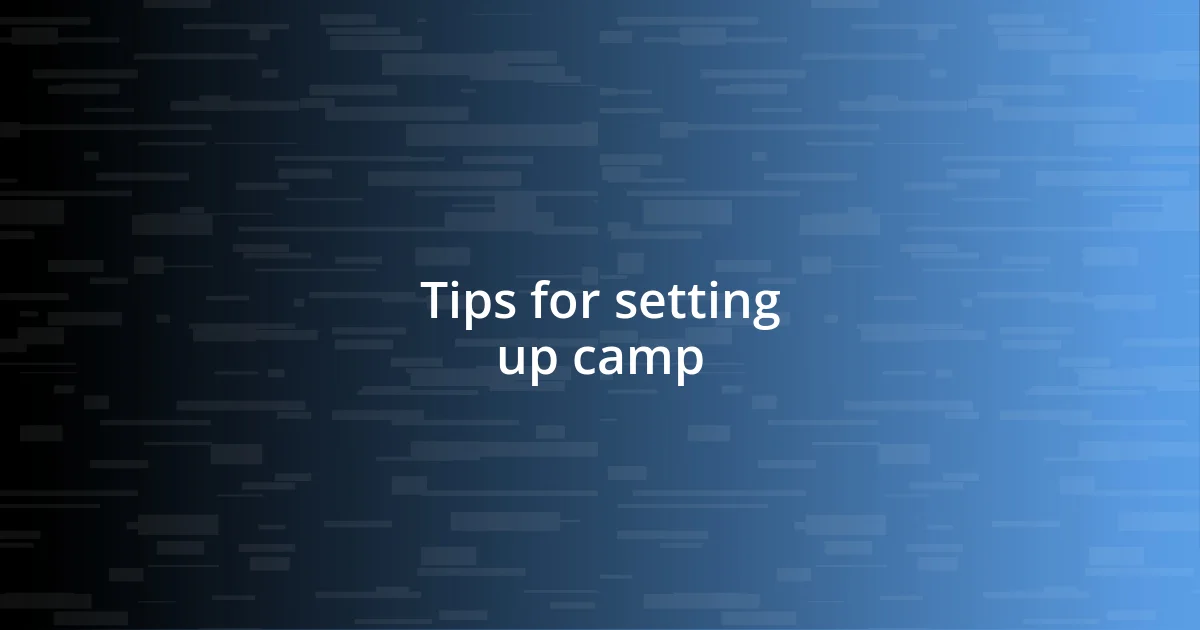
Tips for setting up camp
Setting up a camp can be an enjoyable experience if you keep a few key tips in mind. Firstly, I’ve learned that choosing the right spot is half the battle. When I last camped by a crystal-clear stream, the soothing sound of water made for an incredible ambiance. However, I also had to consider the risks like flooding. Finding a flat area that is away from water sources and potential hazards really made a difference in how safe and comfortable my nights were.
Here are some handy tips for setting up camp:
- Pick a Level Site: Look for even ground to ensure a comfortable sleep and avoid rolling off your sleeping pad.
- Set Up Away from Hazards: Avoid areas under dead trees or branches that could fall, along with areas prone to flooding.
- Orient Your Tent for Comfort: Position your tent so the entrance faces away from prevailing winds and morning sun for a more comfortable wake-up.
- Leave No Trace: Always set up in durable areas to minimize impact on the environment. Carry out everything you bring in!
When I think of packing my gear, I often remember that I should utilize any downtime to organize my things. For instance, one memorable trip had me setting up in a downpour, and my gear ended up in a chaotic heap outside. Using dry bags and keeping my cooking gear separated made cooking a breeze, even in less-than-ideal weather. It was a learning experience that solidified the importance of staying organized; I didn’t want to be floundering around while the rain poured down.
Staying organized is essential for a smooth camping experience:
- Use Dry Bags: Protect your gear from moisture with waterproof bags for clothes and camping equipment.
- Pack Smartly: Keep similar items together — cooking gear in one spot, sleeping gear in another — for easy access.
- Organize Essentials: Have a dedicated pouch for headlamps and batteries, so you never have to scramble in the dark again.
- Practice Packing: Every time I go camping, I rehearse packing my gear efficiently, which pays off when I’m trying to set up quickly in adverse conditions.
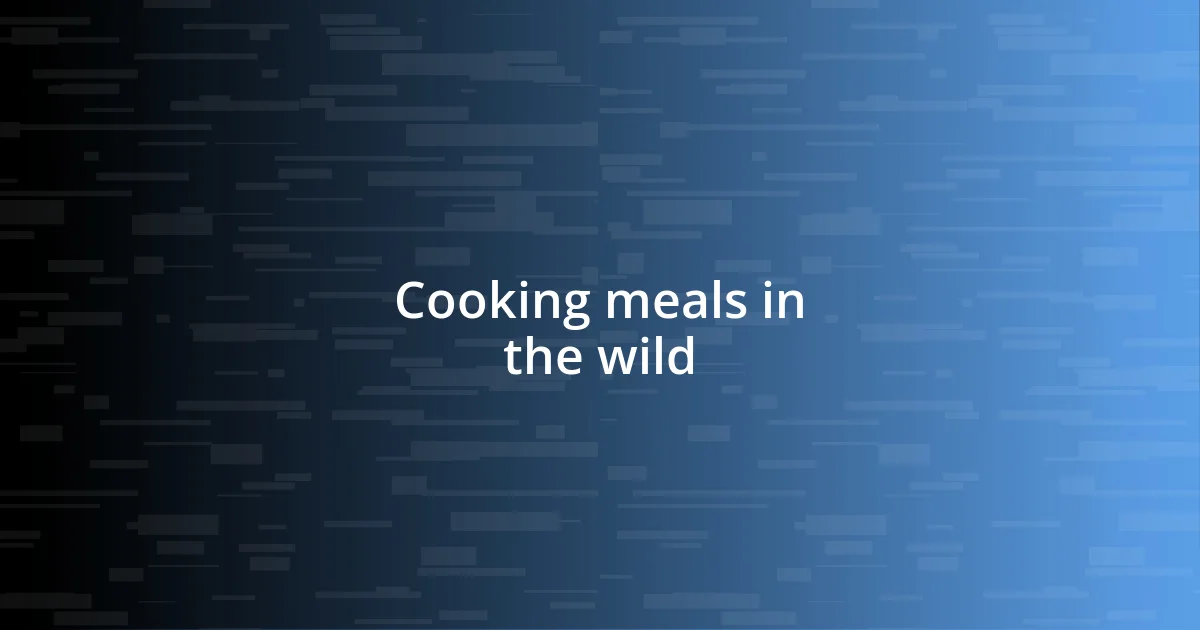
Cooking meals in the wild
Cooking meals in the wild can be one of the most rewarding experiences, both in taste and in the sense of accomplishment it brings. I remember the first time I successfully cooked a warm meal over an open fire. It was simple—just some chili beans and cornbread—but the flavors burst in a way that felt special because I had created it all from scratch, surrounded by nature. Isn’t it amazing how meals can taste so much better when you’ve earned them?
Using a camping stove, like the one I mentioned before, allows for more controlled cooking. On one camping trip, I had the chance to prepare a stir-fry with fresh ingredients I had packed. The aroma wafting through the trees drew curious onlookers; my friends couldn’t resist joining me. It struck me then that cooking outdoors is not just about sustenance; it’s a way to gather and bond, creating memories that last much longer than the meal itself. Isn’t communal cooking in nature just perfect for building great connections?
And while cooking in the wild can be a joy, it requires preparation. I can’t emphasize enough how essential it is to have your cooking setup organized. One night, during a cooking experiment, I realized I had no utensils because I forgot to pack them. I ended up using a stick to stir my soup—definitely not my finest moment! This experience taught me a valuable lesson: always double-check your gear list. After all, nothing ruins the thrill of a campfire meal faster than scrambling for missing equipment!
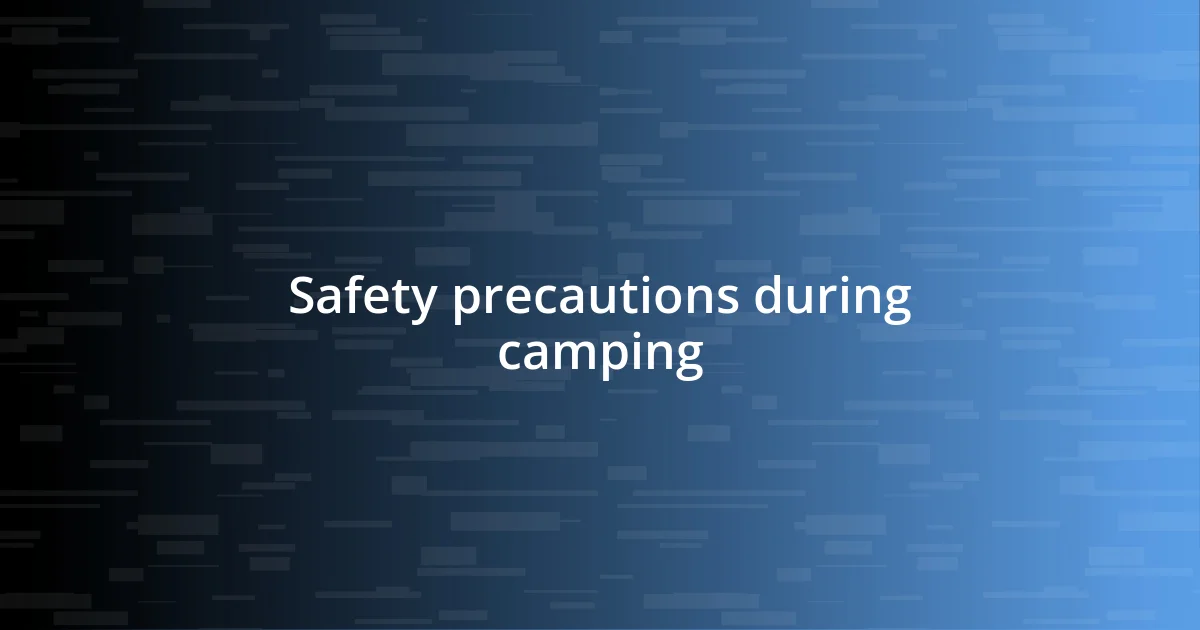
Safety precautions during camping
When it comes to safety precautions during camping, I can’t stress enough the importance of being aware of your surroundings. I vividly recall a trip where I underestimated the weather; a clear sky soon turned into an unexpected storm. Checking forecasts regularly and keeping an eye on local conditions can save you from dangerous situations. Have you ever been caught off guard like that? It’s a humbling reminder that nature can be unpredictable.
Another crucial safety measure is understanding wildlife safety. Once, while hiking back to my tent after a long day, I stumbled upon a mother bear and her cubs. My heart raced as I remembered the advice I’d read: never approach wildlife, and make loud noises to alert them of your presence. Keeping a safe distance and being aware of food storage techniques is essential. I learned the hard way that trusting my instinct to back away slowly was the right move; those moments stick with you!
Lastly, it’s essential to have basic first aid supplies and knowledge. I once assisted a fellow camper who twisted their ankle on a rocky trail. I was grateful for the small first aid kit I had packed. It’s amazing how a few band-aids and some antiseptic can make a world of difference in a crisis. So, do yourself a favor: familiarize yourself with first aid basics before heading out. Trust me, being prepared can turn a potential disaster into a manageable situation.
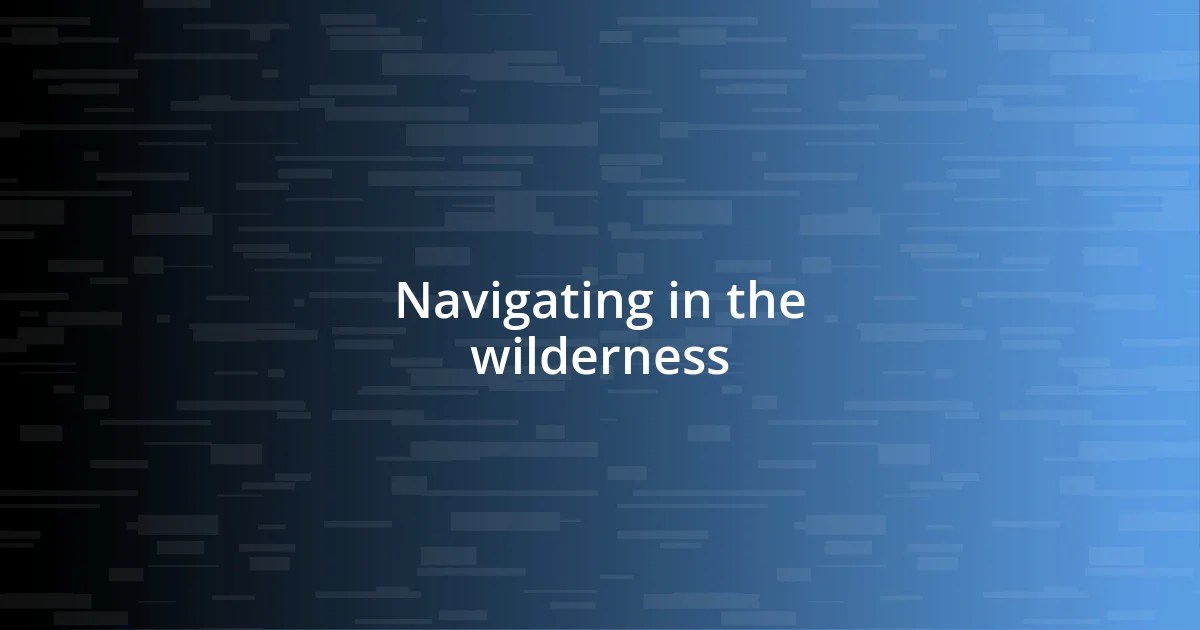
Navigating in the wilderness
When I first ventured into the wilderness without a map, I quickly learned that navigating can be an exhilarating yet daunting task. I had a compass and a rough sense of direction, but as the sun started setting, everything began to look the same through the dense trees. Have you ever felt that rush of panic when you realize you’re not exactly sure where you are? It’s an emotion I won’t forget—one that taught me the importance of preparation and awareness.
One time, I relied on my smartphone’s GPS, thinking modern technology would guide me flawlessly. However, halfway through my hike, I lost reception. It hit me hard: technology can fail, but knowing how to read a physical map became my saving grace. I found myself tracing my route on the map with my finger and using the landmarks around me to align. This only deepened my appreciation for traditional navigation skills. Isn’t there something empowering about finding your way through sheer instinct and a bit of guidance from the natural world?
As I became more confident in my navigation skills, I discovered the joy in using natural markers—like the position of the sun or the growth patterns of trees—to guide my path. I remember a chilly evening when I stood on a hill, watching the sunset paint the sky. In that moment, I realized how nature provides subtle hints and clues if you’re willing to observe. Learning to navigate in the wild not only enhanced my outdoor adventures but also instilled a sense of respect for the environment and my place within it. It reminds me: nature is not just a backdrop; it’s a guide if we know how to listen.
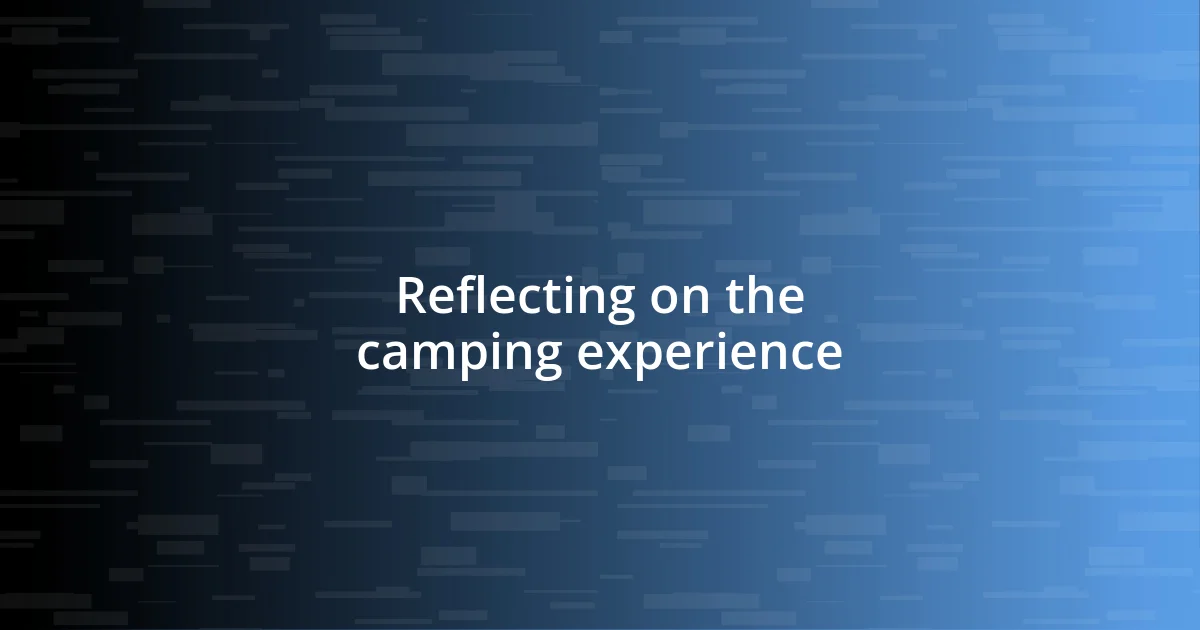
Reflecting on the camping experience
Reflecting on my camping experience, I often find myself pondering the moments that took me out of my comfort zone. On one particular trip, I faced the stark silence of the wilderness and, for the first time, truly appreciated solitude. Have you ever felt that eerie quiet when you are completely alone in nature? It struck me how comforting and unnerving solitude can be—a space to think yet also an invitation to confront my own thoughts.
One night, I sat by the fire, feeling the warmth on my skin as I listened to the crackling wood. It was in that serene moment that I realized how vital these pauses are for reflection. I found myself contemplating not just the beauty surrounding me, but also my place in it. The stars above seemed to whisper secrets of the universe, reminding me of how small we really are—yet how our experiences, big or small, shape our understanding.
Through each trip, I learned that reflection offers clarity. I recall a morning where I woke up early, the mist hanging low over the lake, and I jotted down my thoughts. It was an exercise in gratitude, recognizing the simple joys of breathing fresh air and witnessing sunrises. How often do we take the time to appreciate these moments in our busy lives? Every camping trip became a reminder to cherish these experiences and foster a deeper connection with nature and myself.



